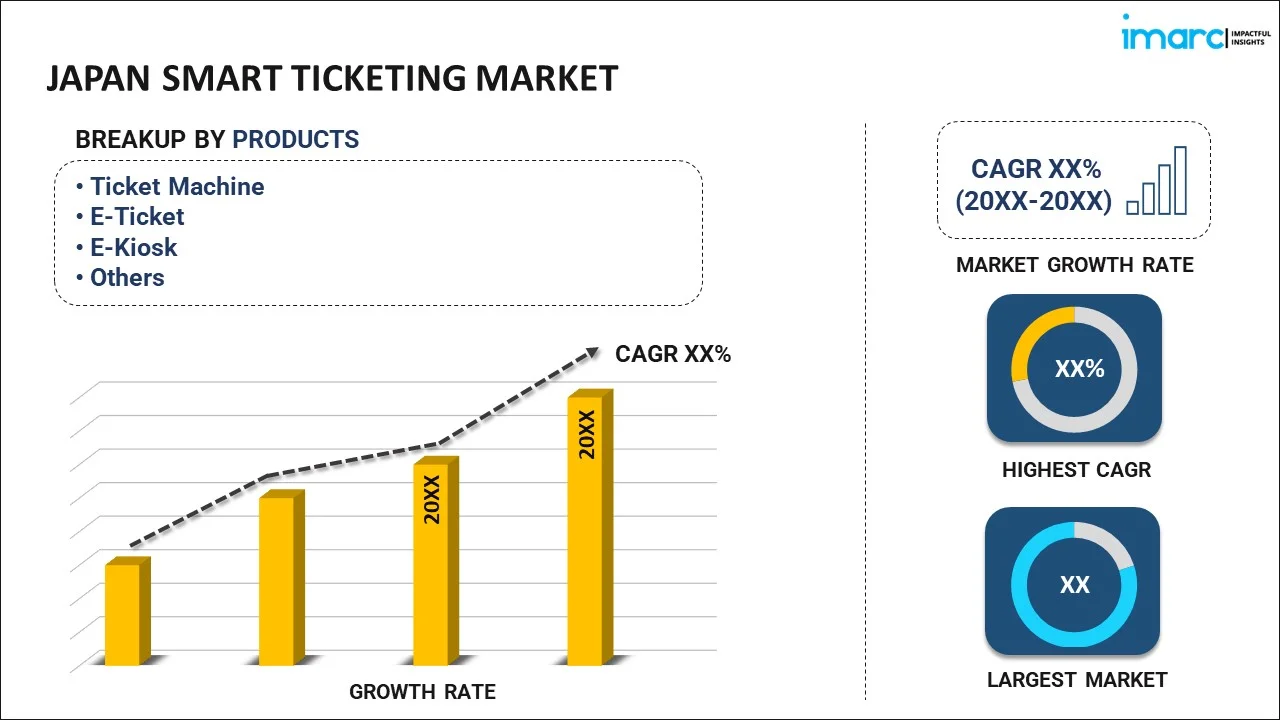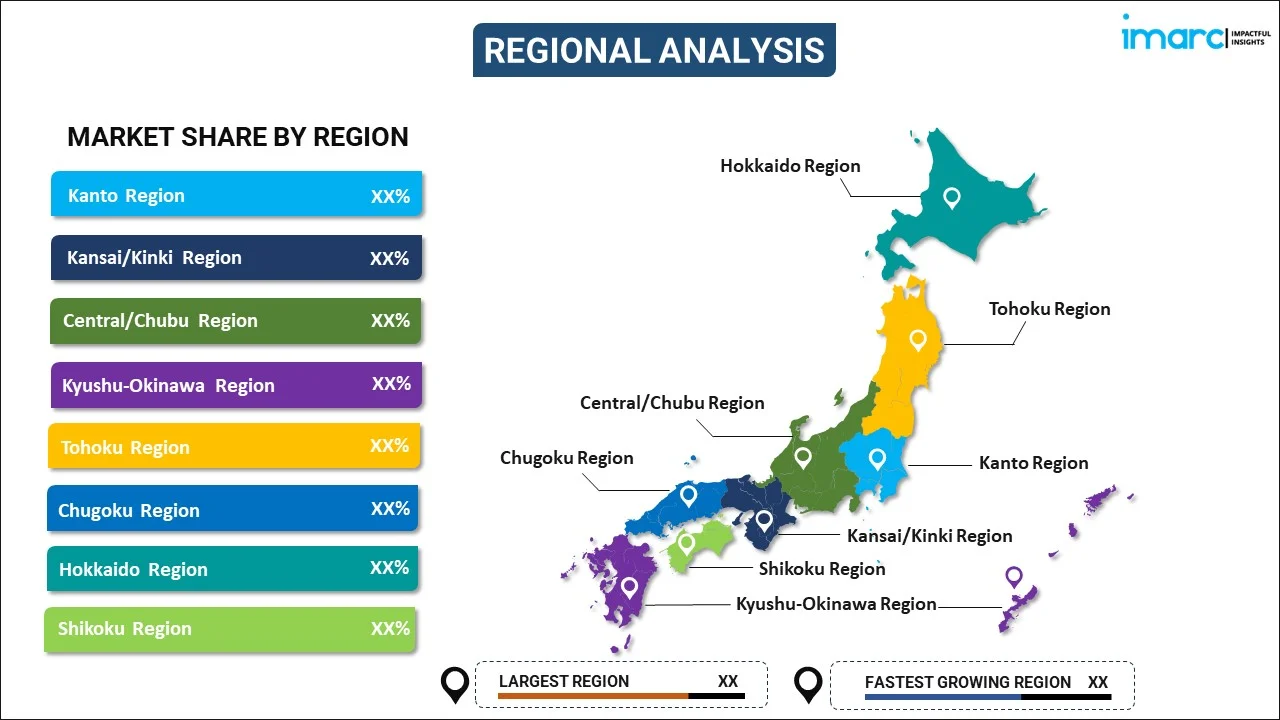
Japan Smart Ticketing Market Report by Product (Ticket Machine, E-Ticket, E-Kiosk, Request Tracker, and Others), Component (Software, Hardware), System (Open Payment System, Smart Card, Near-Field Communication), Application (Sports and Entertainment, Transportation, and Others), and Region 2026-2034
Market Overview:
Japan smart ticketing market size reached USD 1,480.4 Million in 2025. Looking forward, IMARC Group expects the market to reach USD 4,658.7 Million by 2034, exhibiting a growth rate (CAGR) of 13.59% during 2026-2034. The increasing demand for efficiency and convenience in public transportation systems, the government's push toward smart city initiatives and sustainable transportation, and the integration of advanced technologies in ticketing systems represent some of the key factors driving the market.
|
Report Attribute
|
Key Statistics
|
|---|---|
|
Base Year
|
2025
|
|
Forecast Years
|
2026-2034
|
|
Historical Years
|
2020-2025
|
| Market Size in 2025 | USD 1,480.4 Million |
| Market Forecast in 2034 | USD 4,658.7 Million |
| Market Growth Rate 2026-2034 | 13.59% |
Access the full market insights report Request Sample
Smart ticketing is a cutting-edge technology that has revolutionized the way people access and use transportation services. At its core, Smart Ticketing is a digital system that simplifies the process of purchasing, storing, and using tickets for various modes of transportation, including buses, trains, trams, and even parking facilities. Unlike traditional paper tickets or tokens, Smart Ticketing relies on electronic methods to streamline the entire ticketing process. This innovative solution encompasses various forms, including contactless smart cards, mobile apps, and even wearable devices, all aimed at providing passengers with a seamless and convenient way to pay for and access transportation services.
Japan Smart Ticketing Market Trends:
One of the primary drivers of this growth is the increasing demand for efficiency and convenience in public transportation systems. As Japan continues to embrace modernization, commuters and travelers are seeking faster, more reliable, and user-friendly ways to navigate the country's extensive transportation network. Smart ticketing offers a solution that caters to these demands by reducing queuing times, eliminating the need for physical cash or paper tickets, and enabling easy transfers between different modes of transport. This convenience factor is a strong motivator for both local residents and tourists, contributing to the expanding market. Furthermore, the government's push toward smart city initiatives and sustainable transportation systems is another influential driver in the Japan smart ticketing market. With a focus on reducing carbon emissions and improving urban mobility, the government has been actively promoting the adoption of innovative technologies in the transportation sector. Smart ticketing aligns perfectly with these objectives, as it encourages the use of public transportation over private vehicles, ultimately leading to reduced traffic congestion and a greener environment. To support this transition, various subsidies and incentives have been introduced to encourage transportation providers to implement smart ticketing solutions, creating a favorable business environment for market players. In addition to these drivers, the integration of cutting-edge technologies into smart ticketing systems is a noteworthy trend in the Japanese market. For instance, the utilization of Near field communication (NFC) technology in contactless smart cards and mobile apps allows passengers to simply tap their cards or smartphones on readers to access transportation services. This enhances the overall user experience and provides valuable data to transportation operators for optimizing routes, schedules, and capacity management. Moreover, the integration of biometric authentication methods, such as fingerprint or facial recognition, adds an extra layer of security and convenience to smart ticketing systems, which is particularly appealing to business travelers and frequent commuters.
Japan Smart Ticketing Market Segmentation:
IMARC Group provides an analysis of the key trends in each segment of the market, along with forecasts at the country level for 2026-2034. Our report has categorized the market based on product, component, system, and application.
Product Insights:

To get detailed segment analysis of this market Request Sample
- Ticket Machine
- E-Ticket
- E-Kiosk
- Request Tracker
- Others
The report has provided a detailed breakup and analysis of the market based on the product. This includes ticket machine, E-ticket, E-kiosk, request tracker, and others.
Component Insights:
- Software
- Hardware
A detailed breakup and analysis of the market based on the component have also been provided in the report. This includes software and hardware.
System Insights:
- Open Payment System
- Smart Card
- Near-Field Communication
The report has provided a detailed breakup and analysis of the market based on the system. This includes open payment system, smart card, and near-field communication.
Application Insights:
- Sports and Entertainment
- Transportation
- Others
A detailed breakup and analysis of the market based on the application have also been provided in the report. this includes sports and entertainment, transportation, and others.
Regional Insights:

To get detailed regional analysis of this market Request Sample
- Kanto Region
- Kansai/Kinki Region
- Central/ Chubu Region
- Kyushu-Okinawa Region
- Tohoku Region
- Chugoku Region
- Hokkaido Region
- Shikoku Region
The report has also provided a comprehensive analysis of all the major regional markets, which include Kanto Region, Kansai/Kinki Region, Central/ Chubu Region, Kyushu-Okinawa Region, Tohoku Region, Chugoku Region, Hokkaido Region, and Shikoku Region.
Competitive Landscape:
The market research report has also provided a comprehensive analysis of the competitive landscape. Competitive analysis such as market structure, key player positioning, top winning strategies, competitive dashboard, and company evaluation quadrant has been covered in the report. Also, detailed profiles of all major companies have been provided.
Japan Smart Ticketing Market Report Coverage:
| Report Features | Details |
|---|---|
| Base Year of the Analysis | 2025 |
| Historical Period | 2020-2025 |
| Forecast Period | 2026-2034 |
| Units | Million USD |
| Scope of the Report | Exploration of Historical Trends and Market Outlook, Industry Catalysts and Challenges, Segment-Wise Historical and Future Market Assessment:
|
| Products Covered | Ticket Machine, E-Ticket, E-Kiosk, Request Tracker, Others |
| Components Covered | Software, Hardware |
| Systems Covered | Open Payment System, Smart Card, Near-Field Communication |
| Applications Covered | Sports and Entertainment, Transportation, Others |
| Regions Covered | Kanto Region, Kansai/Kinki Region, Central/ Chubu Region, Kyushu-Okinawa Region, Tohoku Region, Chugoku Region, Hokkaido Region, Shikoku Region |
| Customization Scope | 10% Free Customization |
| Post-Sale Analyst Support | 10-12 Weeks |
| Delivery Format | PDF and Excel through Email (We can also provide the editable version of the report in PPT/Word format on special request) |
Key Questions Answered in This Report:
- How has the Japan smart ticketing market performed so far and how will it perform in the coming years?
- What has been the impact of COVID-19 on the Japan smart ticketing market?
- What is the breakup of the Japan smart ticketing market on the basis of product?
- What is the breakup of the Japan smart ticketing market on the basis of component?
- What is the breakup of the Japan smart ticketing market on the basis of system?
- What is the breakup of the Japan smart ticketing market on the basis of application?
- What are the various stages in the value chain of the Japan smart ticketing market?
- What are the key driving factors and challenges in the Japan smart ticketing?
- What is the structure of the Japan smart ticketing market and who are the key players?
- What is the degree of competition in the Japan smart ticketing market?
Key Benefits for Stakeholders:
- IMARC’s industry report offers a comprehensive quantitative analysis of various market segments, historical and current market trends, market forecasts, and dynamics of the Japan smart ticketing market from 2020-2034.
- The research report provides the latest information on the market drivers, challenges, and opportunities in the Japan smart ticketing market.
- Porter's five forces analysis assist stakeholders in assessing the impact of new entrants, competitive rivalry, supplier power, buyer power, and the threat of substitution. It helps stakeholders to analyze the level of competition within the Japan smart ticketing industry and its attractiveness.
- Competitive landscape allows stakeholders to understand their competitive environment and provides an insight into the current positions of key players in the market.
Need more help?
- Speak to our experienced analysts for insights on the current market scenarios.
- Include additional segments and countries to customize the report as per your requirement.
- Gain an unparalleled competitive advantage in your domain by understanding how to utilize the report and positively impacting your operations and revenue.
- For further assistance, please connect with our analysts.
 Request Customization
Request Customization
 Speak to an Analyst
Speak to an Analyst
 Request Brochure
Request Brochure
 Inquire Before Buying
Inquire Before Buying




.webp)




.webp)












